英语必修1人教版导学案:Unit 4 Earthquake-reading (新人教版必修1)
高一英语必修一Unit4 Earthquakes ---- (Reading)教学设计
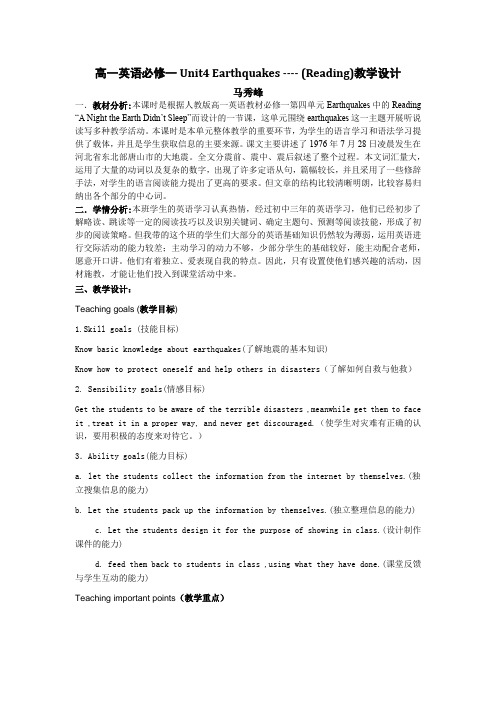
高一英语必修一Unit4 Earthquakes ---- (Reading)教学设计马秀峰一.教材分析:本课时是根据人教版高一英语教材必修一第四单元Earthquakes中的Reading “A Night the Earth Didn’t Sleep”而设计的一节课,这单元围绕earthquakes这一主题开展听说读写多种教学活动。
本课时是本单元整体教学的重要环节,为学生的语言学习和语法学习提供了载体,并且是学生获取信息的主要来源。
课文主要讲述了1976年7月28日凌晨发生在河北省东北部唐山市的大地震。
全文分震前、震中、震后叙述了整个过程。
本文词汇量大,运用了大量的动词以及复杂的数字,出现了许多定语从句,篇幅较长,并且采用了一些修辞手法,对学生的语言阅读能力提出了更高的要求。
但文章的结构比较清晰明朗,比较容易归纳出各个部分的中心词。
二.学情分析:本班学生的英语学习认真热情,经过初中三年的英语学习,他们已经初步了解略读、跳读等一定的阅读技巧以及识别关键词、确定主题句、预测等阅读技能,形成了初步的阅读策略。
但我带的这个班的学生们大部分的英语基础知识仍然较为薄弱,运用英语进行交际活动的能力较差;主动学习的动力不够,少部分学生的基础较好,能主动配合老师,愿意开口讲。
他们有着独立、爱表现自我的特点。
因此,只有设置使他们感兴趣的活动,因材施教,才能让他们投入到课堂活动中来。
三、教学设计:Teaching goals (教学目标)1.Skill goals (技能目标)Know basic knowledge about earthquakes(了解地震的基本知识)Know how to protect oneself and help others in disasters(了解如何自救与他救)2. Sensibility goals(情感目标)Get the students to be aware of the terrible disasters ,meanwhile get them to face it ,treat it in a proper way, and never get discouraged.(使学生对灾难有正确的认识,要用积极的态度来对待它。
高中英语必修1人教版精品导学案:Unit 4Earthquakes
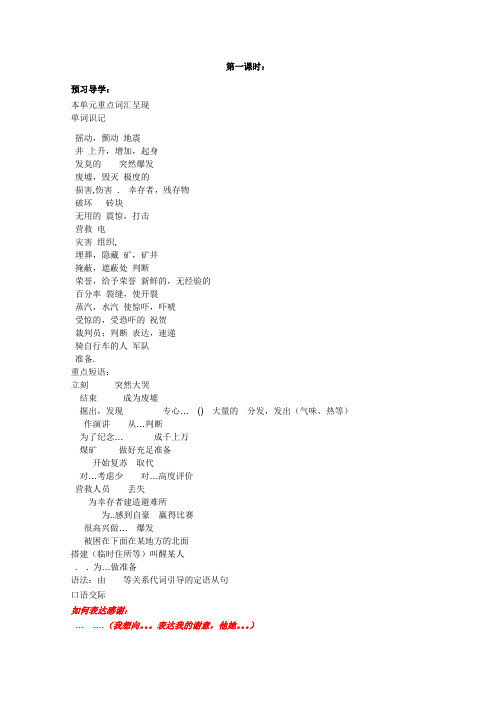
第一课时:预习导学:本单元重点词汇呈现单词识记摇动,颤动地震井上升,增加,起身发臭的突然爆发废墟,毁灭极度的损害,伤害 . 幸存者,残存物破坏砖块无用的震惊,打击营救电灾害组织,埋葬,隐藏矿,矿井掩蔽,遮蔽处判断荣誉,给予荣誉新鲜的,无经验的百分率裂缝,使开裂蒸汽,水汽使惊吓,吓唬受惊的,受恐吓的祝贺裁判员;判断表达,速递骑自行车的人军队准备.重点短语:立刻突然大哭结束成为废墟掘出,发现专心… () 大量的分发,发出(气味,热等)作演讲从…判断为了纪念… 成千上万煤矿做好充足准备开始复苏取代对…考虑少对…高度评价营救人员丢失为幸存者建造避难所为..感到自豪赢得比赛很高兴做… 爆发被困在下面在某地方的北面搭建(临时住所等)叫醒某人. . 为…做准备语法:由等关系代词引导的定语从句口语交际如何表达感谢:… ….(我想向。
表达我的谢意,他她。
), …(在此,我想感谢。
的努力)…(我还要感谢…)…(没有任何词足以表达我们的。
)如何描述地震时的情景:(翻译成英语)当时真是可怕就好像我记得我觉得那之后没多久幸运的是实战演练I. 用所给单词的适当形式填空:, , , , , , , , , , , , ,. .. , .. .. .. .. . .. .. .. .. .. 根据所给单词选择合适的英文释义:. ( ) , , , , ;( ) , , , .. ; ; ; ... , ; .. , . , , , , , .. .. .. ; .. ; , . .. ; ; .. 用本单元所学单词填空1. , (晃动).2. , (有气味的).3. , (爆发) .4. (运河).5. .6. (灰尘). ?7. , .8. . , (受伤的).9. (幸存者) .10. (判断), ..短语翻译:立刻,马上水管突然大笑起来上百万的结束,终结破败不堪,一片废墟毁坏一个城市营救某人脱离危险自然灾害从……来判断挖掘,发现煤矿为幸存者搭建避身处弄伤一支胳膊许多的,大量的反馈检测单项选择. ’ ? .. . . . . .. , . ,. , . ,. .. , . ,. , . ,. .. . . .. .. , ,. , . ,. ’ .. . . .. , .. . . .. , .. . . .. .. . . .. .. . . .. , .. . . .. ’ .. . . .. ?. .. .. .. ; . ; . ; ;. , .. . . .第二课时:预习导学浏览课文,回答以下问题:a. ?b. ?. 根据主题句,找出段落大意:... 仔细阅读课文,完成下面的表格:( ) .() .( ); .. 文中所提到的数字:’ ?? .? .’ ? .?; ; .?.. 根据课文内容判断正误。
如何教授《新人教版必修1Unit4Earthquakereading》:教案参考
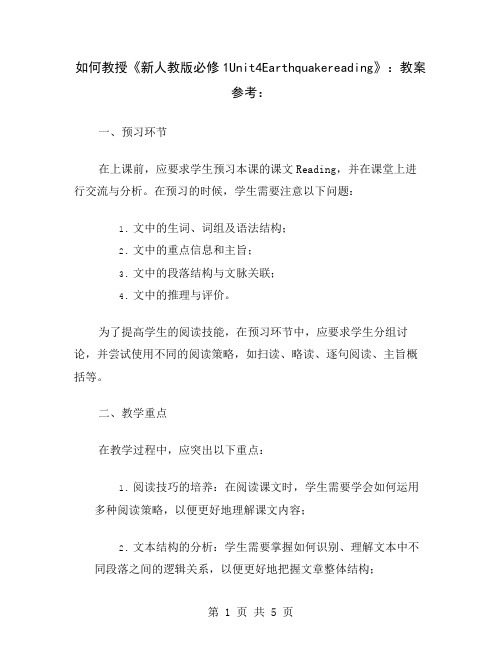
如何教授《新人教版必修1Unit4Earthquakereading》:教案参考:一、预习环节在上课前,应要求学生预习本课的课文Reading,并在课堂上进行交流与分析。
在预习的时候,学生需要注意以下问题:1.文中的生词、词组及语法结构;2.文中的重点信息和主旨;3.文中的段落结构与文脉关联;4.文中的推理与评价。
为了提高学生的阅读技能,在预习环节中,应要求学生分组讨论,并尝试使用不同的阅读策略,如扫读、略读、逐句阅读、主旨概括等。
二、教学重点在教学过程中,应突出以下重点:1.阅读技巧的培养:在阅读课文时,学生需要学会如何运用多种阅读策略,以便更好地理解课文内容;2.文本结构的分析:学生需要掌握如何识别、理解文本中不同段落之间的逻辑关系,以便更好地把握文章整体结构;3.语言运用能力的提高:学生需要掌握如何使用简单句、复合句等语法结构,以便更好地理解文章中的语言表达,并提高自己的写作能力。
三、教学内容1.对话交流环节在课前,教师可以通过PPT或黑板等媒介,呈现出一些地震相关的图片或视频,并引发与学生的讨论。
在此环节,教师应该不断引导学生,提醒学生注意与地震相关的词汇、短语、句型等,为之后的阅读做好铺垫。
2.阅读训练环节在此环节之前,教师可以对学生进行一些预热,以调动学生阅读的兴趣和积极性。
例如:a、教师可以采用问答的方式,向学生提出一些与地震相关的问题。
学生在问题回答的过程中,可以感性认识到地震危害的严重性,进而激发他们对阅读的兴趣。
b、教师可以设计一些小组活动或语言游戏,在短时间内让学生积极参与,提高他们的语言能力。
在阅读训练的环节中,教师应该为学生提供阅读指导,并采用不同的阅读策略对学生进行训练。
例如:a、扫读:让学生快速浏览整篇文本,了解文章的篇幅、主旨等信息。
b、略读:让学生找出与地震相关的词汇、短语、句型等,并强调细节部分的理解。
c、逐句阅读:让学生逐个句子阅读,并理解每个句子的意思,在理解单个句子的基础上,把握文章的主要思想。
高中英语人教版必修1unit4EarthquakesReading教案(系列四)

必修一 Unit 4 EarthquakesReadingTeaching goals:1.Target language 目标语言Learn and master the new words and expressions in this period.2. Ability goals 能力目标Train the students’ reading and speaking ability. Train the students’ ability to use the Inter net to search for some useful information. Train the students’ ability to cooperate with others.Teaching important points:Train the students’ reading ability—skimming and scanning.Teaching difficult points:Describe the disasters.Teaching aids:CIA课件Teaching procedures:Stage1 (Warming up) Watching a videoStep1 Teacher divides the class into 6 groups,students work in group to solve the tasks.设计意图:进行小组合作,培养学生团队合作意识和协作精神。
Step2 Students look at the video about Wen Chuan earthquake with the questions.1. Have you ever experienced an earthquake?2. What happened in an earthquake?Suggested Answer :(Roads, railways, bridges and buildings are destroyed. Everything is in ruins. Many people died……People lost their homes….The army was sent to rescue the p eople.)3. How many several terrible earthquakes do you know in the world?Suggested Answer:(Japanese earthquake March 11st, 2011 Gansu yushu earthquake April 14th, 2010 Haiti earthquake January 12nd, 2010 Sichuan wenchuan earthquake May 12nd, 2008 Hebei Tangshan earthquake July 28th, 1976)设计意图:利用视频导入,一方面能激发学生的学习兴趣和背景知识,另一方面为下文的主题做好铺垫。
高中英语 Unit 4 Earthquakes导学案(pdf)新人教版必修1 学案

3. a l l ������ n o t ������ 部分否定 [ 原句 ] 不是所有的希望都破 A l lh o ew a sn o tl o s t . p t h er e s u m t i o no f t h ew e e k l o n a a o l i d a . p gM yD yh y 4. a s引导的非限制性定语从句 如你所知 , 这就是地震发生的那一天 ㊂
2 5. 2 6.
u d e m e n t j g s i n c e r e l y e x r e s s p s i n c e r e
e x t r e m e l y i n u r e d j i n u r j y d e s t r o y t r a c k
损害 ; 伤害 v t . 受伤的 a d j. ; 伤害 损害 n. 破坏 n.
/ 3. T h ec h u r c ht h a t w h i c hw a sc o m l e t e di n1 8 6 6w a s p
/ / 4. I ������ d l i k e t o f i n ds o m e o n ew h o w h o m t h a t I c o u l dd i s c u s s i n d o w 5. I ������ dl i k et ob o o kar o o mi ny o u rh o t e lw h o s ew f a c e s t h es o u t h .
1 3.
ห้องสมุดไป่ตู้
1 5.
1 4. 1 6.
s h o c k i n g r e s c u e t r a p
s h o c k e d
高中英语 高一年级 必修一Book1 Unit4 earthquake 导学案
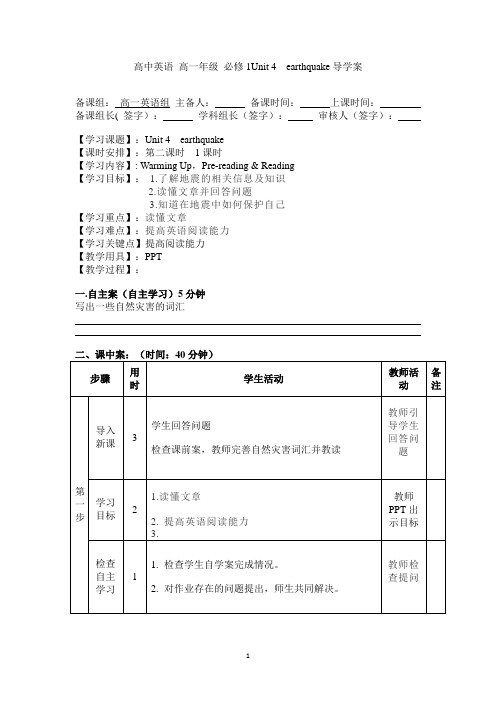
高中英语高一年级必修1Unit 4earthquake导学案备课组:高一英语组主备人:备课时间:上课时间:备课组长( 签字):学科组长(签字):审核人(签字):【学习课题】:Unit 4earthquake【课时安排】:第二课时1课时【学习内容】:Warming Up,Pre-reading & Reading【学习目标】:1.了解地震的相关信息及知识2.读懂文章并回答问题3.知道在地震中如何保护自己【学习重点】:读懂文章【学习难点】:提高英语阅读能力【学习关键点】提高阅读能力【教学用具】:PPT【教学过程】:一.自主案(自主学习)5分钟写出一些自然灾害的词汇三、课后案:习题冲关(时间:20 分钟)[B]I’ve always been interested in computers and technology, and I made a few apps (应用程序) for the iPhone, iPod touch, and iPad. I’d like to share a couple with you today. My first app is “Earth Fortune”. My favorite and most successful appis “Bustin Jieber”— which is a Justin Bieber whack-a-mole (打地鼠游戏). I created it because a lot of people at school disliked the pop star a little bit, so I decided to make the app. I released (发布) it on December 21, 2010.A lot of people asked me, how did I make these? A lot of times it’s because the person who asked the question wants to make an app also. Where do you go to find out how to make an app? Well, this is how I got close to it, and this is what I did.First of all, I’d already been programming in many programming languages to get the basics down, such as Python, C, Java, etc. And then Apple released the iPhone with the software development kit (软件开发工具包) — a set of tools for creating and programming an iPhone app. This opened up a whole new world of possibilities for me, and after playing with the kit a little bit, I made a couple of test apps. I persuaded my parents to pay 99 dollars to be able to put my apps on the App Store. They agreed, and now I have apps on the App Store.I’ve gotten a lot of creative ideas from Steve Jobs, and I’ve started an app club at school with the help of my teacher. Any student at my school can come and learn how to design an app.I’d like to finish up by saying what I’d like to do in the future. I’m working with a third party company to make an app. My next goal is to get into Android programming and development, continue my app club, and find other ways for students to share knowledge with others.That’s all. Thank you!1. What can we learn about Bustin Jieber?A. It is the author’s first app for the iPhone.B. It was released at the beginning of 2010.C. It is popular with Justin Bieber fans.D. It is a whack-a-mole game.2. What allowed the author possibilities to program?A. His teacher’s guidance.B. Test apps on the App Store.C. Apple’s software development kit.D. The Java programming language.3. What did the author do after he finished his test apps?A. He bought an iPhone.B. He met with Steve Jobs.C. He sold them to the App Store.D. He asked his parents for support.4. What’s the author’s future plan?A. To set up an app club.B. To design an Android app.C. To put his apps on the App Store.D. To share his apps with others for free.课后反思:。
高中英语人教版必修1教案: unit 4 Earthquakes Reading 教案

高中英语人教版必修1教案: unit 4 Earthquakes Reading 教案初中、高中、教案、习题、试卷必修一 Unit 4 EarthquakesReading1.知识与能力了解唐山大地震的先兆、地震造成的损失及救灾等情况,培养学生获取信息和处理信息的能力。
通过略读找到每段的主题句;通过查读掌握细节;通过细读,理教学目标解课文标题的含义,从而培养阅读理解微技能。
语言点:leave的复合宾语、everywhere 引导从句等。
语篇重建:在正确理解课文的基础上,能根据教师提供的图表用自己的话复述课文,设计一次对唐山大震幸存者的访谈。
2.情感目标:通过了解唐山大地震前兆,培养学生对自然灾害的应对意识和能力;通过灾后重建,使学生树立战胜自然灾害的信心。
1.教学重点:通过语篇学习,掌握新闻报道的文体写作特点。
教学重难点培养学生对新闻报道文体的阅读技巧。
2.教学难点:在充分阅读的基础上,对课文进行复述和表达自己的观点。
课文中的语言难点。
教学过程步骤教学活动设计意图 Task 1:利用多媒体播放一段地震视频。
学生看过,利用视频导入,一方面Step 1:导入进行讨论。
教师利用视频内容,介绍新单词。
Questions: What is the film about 可以激发学生的学习兴趣和探究的动机,另一方面,为学生提供话题初中、高中、教案、习题、试卷What can you see in the film Task 2: 整体理解文,归纳课文大意。
Step 2:快速阅读导入新课。
梳理清楚课文线索。
为要求学生快速通读全文,按时间顺序把文章分成三部各个环节的理解和开展分并概括大意。
做铺垫。
整体粗读,领略内容大意。
Task 3:细读课文,查找信息。
细读环节的任务有两个要求学生阅读课文后判断句子对与错,并说出理。
方面,其一是通过细读,① People in Tangshan were warned of the earthquake and didn’t go to bed that night. (F) ②People in Beijing also felt the earthquake. (T) ③More than 400,000 people were killed in the quake. (F) ④ Many rescue workers and doctors were trapped under the ruins during the aftershock. (T) 学生学会查找细节信息的能力。
高中英语:Unit4 Earthquake-reading 教案(新人教版必修1)

Unit4 Earthquake- reading教案Teaching goals:1.Target language 目标语言Learn and master the new words and expressions in this period.2.Ability goals 能力目标Train the students’ reading and speaking ability.Train the students’ ability to use the Internet to sea rch for some useful information.Train the students’ ability to cooperate with others.Teaching important points:Train the students’ reading ability—skimming and scanning.Teaching difficult points:Describe the disasters.Teaching aids:CIA课件Teaching procedures:Step1. Lead-inT: We have a visit to the museum of natural disasters, and you have learned about some brief introduction of most disasters. Today, I want to show you round the earthquake department, and I hope you will like it and learn some u seful knowledge. Now let’s go.T: At the very beginning, I want to know how much you know about an quake.Q1: What would you take with you if a quake happened?Q2: The best way to save yourself is to know there will be a quake before it happens. What kind of signs can tell you that there is a quake?Q3: What kind of damage can an earthquake cause?S: buildings are destroyed; people are killed; families are broken…T: Let’s have a look at some pictures of such terrible site. (Pictures of quakes)T: (The last picture is monument of Tangshan quake.) Do you know what this is?Step2. Pre-ReadingT: 30 years ago, on the day July, the 28th, a terrible disaster suddenly happened, and the beautiful Tangshan was removed from the map. This is Tangshan quake. Does any body know something about Tangshan quake?T: Let’s read a news report about the famous quake.Step3. While-readingI. Skimming & scaringGet the students prehend the passage quickly and accurately, and meanwhile help the students to form a good habit of reading.T: First please skim the passage fast to obtain/ get a general understanding of the whole passage. And underline the answers to the following questions.Para.1 before the quakePara.2-3 during the quakePara.4 after the quakeII. Careful-readingRead the passage again and try to get more detailed information.T: Now let’s read the passage again and find more information. Join the correct parts of the sentences. (Turn to page 27, ex1)T: Now you have read the passage carefully, please put the sentences in order. Number each of these things during the Tangshan quake.(Turn to page 27, ex2)T: here are some more work for you. You can work in groups.T: Let’s watch some pictures, and paring the old Tangshan, the Tangshan after quake, and the new Tangshan we see today.Step 4 Post-reading (discussing)T: After read the news report, and see so many pictures, what impresses you most? Why?Or what do you learn from such a disaster?(Self-rescue, environment protection, rebuilt, love and help)I: self-rescue (a video game)T: When in a quake, if you know some self-rescue skills, you may probably save yourself. If you want to know some of the skills, click here. (Link to the index)Let’s do little game to see how much you know about self-rescue.II. What did they suffer and feel?T: Can you understand what they suffer and what they feel after such a disaster?T: If you were one of the rescuers 30 years ago, what could you say and what can you do to fort them? Or how could you help them?III. RebuildingT: we see that the new Tangshan has been set up. What is needed to rebuild Tangshan.IV: environment protectionT: nowadays there are more disasters than before. One of the reasons is that we pay more attention to our economy development than the earth we live.Look at these pictures. What can we students do to save the earth?T: Though the disasters destroy buildings, people’s lives, but it can not des troy the love among us.Step 5 Homework1.Find more news reports about earthquake.2.Write a piece of news about Tangshan. You can use the information in the passage.。
人教新课标高中英语必修一Unit 4 Earthquakes导学案

高一英语必修1Unit4Earthquakes导学案第一课时阅读课(语篇分析)I. 教学准备教学目标:1. Get the students to know basic knowledge about natural disasters, especially the knowledge about earthquake through the understanding of the text.2. The long and difficult sentences in the text. The importance in this text is the attributive clause.For example: Then, later that afternoon, another big quake which was almost as strong as the first one shook Tangshan.通过分析,教会学生如何分析长难句。
2. 教学重点/难点1.培养学生如何抓主旨大意和段落大意的能力。
2.运用阅读策略培养学生的其他的阅读理解能力。
3.帮助学生学会分析长难句。
II. 教学过程Step1. 语篇导读Lead-in1.Do you believe doomsday, the end of the world? What will happen on the day?2.Introduce the disaster “Hurricane , Tsunami, Volcano eruption, Earthquake” Which disaster makes you frightened most?3.Discussion: How much do you know about an earthquake?Step 2. Skimming用一句话概括What does the passage mainly talk about?The passage mainly talks about a terrible________(回答what?) that happened in ________( where?) in _______( when? ) and caused great damage to people. (What result?)Step 3. Fast reading1. Read the passage quickly and try to match(匹配) each paragraph with its main idea. Pay attention to (注意) the first and second sentences of each paragraph.Para 1 The earthquake destroyed the city of Tangshan.Para 2 The army came to help the survivors, bringing hope for a new life. Para 3 Before the earthquake strange things began to happen, but no one paid attention to them.Para.4 The people were very shocked at the destruction.2. We can divide the four paragraphs into three parts, match it with its main ideaPart 1 (Para.1 ) damage during the earthquakePart 2 ( ) The rescue work after the earthquake Part 3 ( ) Signs before the earthquake.☆点拨:Structure of the whole passageStep 4 Details of each partPart 1 Before the earthquake*the water ________________________________________________ *the well walls _______________________________________________ *chickens & pigs _______________________________________________ *mice ________________________________________________ *the water pipes ________________________________________________ *people ________________________________________________ Part 2I.II..Data ( 数据)(1)_______ of the nation felt the earthquake.(2)A huge crack that was kilometres long and metres wide cut across houses.(3)In terrible seconds a large city lay in ruins.(4) of the people died or were injured during the earthquake.(5) The number of people who were killed or injured reached more than .(6)All of the city’s hospitals, of its factories and buildings and of its homes were gone.Part 3 What happened after the earthquake1)The sent 150,000 soldiers to Tangshan, and organized teams to dig out those who were trapped and to bury the dead.2)Workers built for survivors whose homes had been destroyed.3)Result: The city began to again.Step 4 Sentences1. 原句:“A huge crack that was eight kilometers long and thirty metres wide cut across houses, roads and canals.”分析:这是一个____________(简单句/ 并列句/主从复合句),该主句的主语为____________,谓语为_________, cut across在这里意为: “径直穿过”, 中间跟一个由that引导的________从句:“that was eight kilometers long and thirty metres wide”, that 在从句中充当______, 修饰的先行词为___________ .翻译:_____________________________________________________________。
高中英语人教版必修1unit4EarthquakesReading教案(系列三)
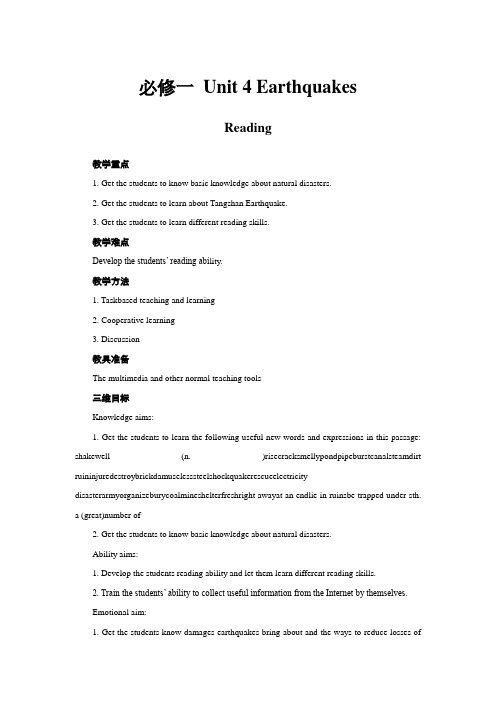
必修一 Unit 4 EarthquakesReading教学重点1. Get the students to know basic knowledge about natural disasters.2. Get the students to learn about Tangshan Earthquake.3. Get the students to learn different reading skills.教学难点Develop the students’ reading abi lity.教学方法1. Taskbased teaching and learning2. Cooperative learning3. Discussion教具准备The multimedia and other normal teaching tools三维目标Knowledge aims:1. Get the students to learn the following useful new words and expressions in this passage: shakewell (n. )risecracksmellypondpipeburstcanalsteamdirt ruininjuredestroybrickdamuselesssteelshockquakerescueelectricity disasterarmyorganizeburycoalmineshelterfreshright awayat an endlie in ruinsbe trapped under sth.a (great)number of2. Get the students to know basic knowledge about natural disasters.Ability aims:1. Develop the students reading ability and let them learn different reading skills.2. Train the students’ ability to collect useful information from the Internet by themselves.Emotional aim:1. Get the students know damages earthquakes bring about and the ways to reduce losses ofearthquakes.2. Get the students to know how to protect oneself and help others in earthquakes.3. Get the students to be aware of terrible disasters, meanwhile get them to face it, treat it in a proper way, and never get discouraged.教学过程设计方案(一)→Step 1 LeadinShow the students some pictures about natural disasters and ask them:1. Have you ever experienced any natural disaster? Look at the pictures. Can you name all the disasters?(volcano, fire, typhoon, flood, sandstorm, hailstone, thunderstorm, hurricane, earthquake)2. Have you ever experienced an earthquake? Can you describe how terrible an earthquake is?地震的破坏(The earth is shaking all the buildings will fall down the roads will be destroyed many people will be killed or injured a lot of children will bee orphans. . . )→Step 2 Warming upTurn to Page 25. Ask the students to read and look at the photos of Tangshan and San Francisco to describe what they see in the two photos to a partner.(beautiful cities broad roads tall building large population. . . )Imagine there has been a big earthquake in these two cities, what might happen to all the things in the photos?(If a big earthquake happened, the whole cities might be in ruins. Large quantities of tall buildings might collapse. The broad and busy roads might be destroyed. Many people might be killed or injured. . . )→Step 3 Prereading1. Imaging and sharingImagine there is an earthquake now. Your home begins to shake and you must leave it right away. You have time to take only one thing. What will you take? Is it money, water, fruits, mobile phones, a torch light, or anything else? Why?2. Talking and sharingWhat do you think may happen before an earthquake? Talk about the pictures on Page 25.(Cows, pigs and dogs bee too nervous to eat. Mice run out of the fields looking for places to hide. Fish jump out of ponds. The water in the well will rise and fall. The well walls will have deep cracks in them. There will be bright light in the sky. . . )→Step 4 ReadingTell the students:Today, we are going to read a news report about the strongest earthquake in China’s history, which happened in Tangshan, Hebei, in 1976.1. Fast readingAsk the students to read the passage quickly and pay attention to the first sentence of each paragraph.1)Answer the questions.Question 1:In what order was the passage written?Question 2:What is the general idea of the passage?(The text is written in time order. The general idea is the mixture of the first sentences of each paragraph, that is, the text tells us something that happened before the earthquake, during theearthquake and after the earthquake. )2)Fill in the table.Type of writingTopic sentence of Paragraph 1Topic sentence of Paragraph 2Topic sentence of Paragraph 3Topic sentence of Paragraph 4General idea of the passageSuggested answers:Type of writing This is a news report.Topic sentence of Paragraph 1 Strange things were happening in thecountryside in northeast Hebei.Topic sentence of Paragraph 2 Everything began to shake and it seemed thatthe world was at an end.Topic sentence of Paragraph 3 Everywhere they looked nearly everything wasdestroyed.Topic sentence of Paragraph 4 All hope was not lost.General idea of the passage The passage tells us something that happenedbefore the earthquake, during the earthquakeand after the earthquake.3)True or False?Ask the students to decide whether the following statements are true or false. If it is false, try to correct it.(1)People in Tangshan were warned of the earthquake and didn’t go to bed that night.(2)People in Beijing also felt the earthquake.(3)More than 400 000 people were killed in the quake.(4)Many rescue workers and tors were trapped under the ruins during the aftershock.(5)People tried to get fresh water from under the ground in Tangshan.Suggested answers:(1)FPeople in Tangshan thought little of the signs of the earthquake and went to bed as usual that night.(2)T(3)FMore than 400 000 people were killed or injured in the quake.(4)T(5)FFresh water was taken to the city Tangshan by train, truck and plane.2. Reading carefullyAsk the students to read the passage carefully to locate particular information.1)Do the exercises in the part prehending on Page 27.2)Fill in the following form.Time What happened ResultBefore the earthquake:three days before the earthquakeat about 3 am on July 28Wells:Animals:Lights and sound:Water pipes:People of the citythought______________and______________While the earthquake:At 3:42 amLater that afternoonHouses, roads andcanals:Hard hills of rock:The large city:The people:Some rescue workers andtors:More buildings:Water, food and electricity:______________ wasdestroyed.______________hospitals, 75%of______________ and 90%of______________ were gone.More than______________were killed or injured.After the earthquake All hope:The army:Workers:Fresh water:The city______________.3)Choose the best answer:(1)What is the mood of this passage?A. Sad.B. Serious.C. Serious and a bit sad.D. Calm.(2)What can be inferred from the passage?A. If mice run out of the fields looking for places to hide, there must be an earthquake.B. If some natural signs had not been ignored, all the people in Tangshan city might have had a chance to survive.C. There wouldn’t have been such a great earthquake, if people had paid enough attention to some natural signs.D. If some natural signs had not been ignored, more people might have had a chance to survive.(3)Which of the following statements can not be part of the main reasons for the heavy loss of life in Tangshan earthquake?A. The earthquake happened in the deep night and people were sleeping in bed at the very movement.B. There weren’t enough rescue workers.C. The buildings were poorly constructed and most of them were destroyed in the earthquake.D. People were not careful enough to notice some natural signs before the earthquake.(4)How do you understand the real meaning of the idiom “It is always calm before a storm”?A. It is unusually quiet before a thunderstorm or hurricane hit.B. One should not trust situations that seem peaceful since bad things may happen.C. The weather is fine before a storm es.D. You should stay calm before a storm.Suggested answers:(1)C(2)D(3)B(4)B3. Language problemsWhile checking the answers with the whole class, deal with any language problems that the students can’t understand.4. Reading aloudPlay the tape of the passage for the students to listen and follow. Then play the tape of Paragraph 1 of the passage once more this time the students listen and repeat.→Step 4 GameWork in pairs. Suppose you are a newspaper reporter, and the other is a witness of the 1976 Tangshan Earthquake. Now the newspaper reporter is interviewing the witness.→Step 5 ExtensionShow the questions on the screen and have a discussion.1. From whose point of view are events described? How do you know?2. What is the mood of this passage? How is it created?3. Why do you think the writer chooses to express his feelings about the quake rather than simply report what had happened?4. Why does the writer use A NIGHT THE EARTH DIDN’T SLEEP as the title?5. What does the sentence “Slowly, the city began to breathe again” mean?Suggested answers:1. A writer’s who didn’t see the earthquake. He uses the thirdperson to describe the quake. His description is very objective. For example, in the second sentence of the third paragraph “Everywhere they looked nearly everything was destroyed. ”, the writer uses “they” instead of “we”.2. The mood is serious and a bit sad. It is created by giving details of how many people and animals were killed or injured and how many buildings were destroyed.3. Although the writer was not there, he felt sad for the people of Tangshan. He knows that giving some personal feelings will make the reading more interesting.4. I think the reason is that, as usual, night is the time to sleep, and night should be safe and quiet. But that ni ght everything changed. The writer uses A NIGHT THE EARTH DIDN’T SLEEP as a title to show how terrible and how unusual that night was.5. Here we can see that the writer pared the city to a person who suffered a lot in the disaster. He felt her pain, and he worried about her. So when he said that people came to help her, we can feel his feelings to her. The city will not die, she has hope and she can recover from the pain.→Step 6 ConsolidationAsk the students to read the passage again and try to retell it.One possible version:Strange things happened in Tangshan. For three days the water in the village wells rose and fell. The well walls had deep cracks and a smelly gas came out the cracks. The chickens, pigs and mice were too nervous. Fish jumped out of bowls and ponds. At 3:00 am on July, 1976, people saw bright lights in the sky and heard the sound of planes even when no planes were in the sky. The water pipes in some buildings cracked and burst.At 3:42 am everything began to shake. It seemed that the world was at the end Onethird of the nation felt it. A huge crack cut across the city. In fifteen terrible seconds a large city lay inruins. Twothirds of the people died or were injured. Nearly everything was destroyed in the city. 75% of its factories and 90% of its homes were gone. Then later that afternoon, another big earthquake shook Tangshan. People began to wonder how long the disaster would last.All hope was not lost. The army sent 150 000 soldiers to help them. Workers built shelters for survivors. Slowly, the city began to breathe again.→Step 7 Homework1. Learn the new words and expressions in this part by heart.2. Read the text again and again and write a summary of the text.。
高中英语人教版必修一Unit4 Earthquakes 复习导学案

Book 1 Unit4 Earthquake 复习导学案Important words1. ___________( adj.) 真诚的_______________ (adv.) 真诚地2. shelter ( n.) ___________ pipe (n.) ______________3. event (n.) __________; __________ the events of the Olympic Games4. useless (adj.) _________ __________________________ 做某事是无用的________________________________ 我们都认为做某事是无用的5. canal (n.) ______ steam ______ dirt ______ dam ________ brick _______6. shock (n.) _______ He was found beaten and in shock.(vt.) _______ sb. be shocked at…___________________7. mine (pron.) _______ That book is mine. ( n.) __________ miner (n.) _______8. damage (n.) ______ sth. cause great damage to… __________(vt.)______ sth. damage his car/ his career9. well (adv.) ______ Everything goes well. (adj. ) ______ I fell well now. (n.) ___10. express (n.) _____ send goods by express / the 8:00 express to London (vt.) _____ express one’s thanks to sb.11. trap (n.) ______set a trap / a mouse- trap(vt.) ______ sb. be trapped in/ under the ruins12. rescue (n.) ______ sb. comes to one’s rescue _____________(vt.) ______ _______________________ 把某人从… 解救出來13. ruin (vt.) ______ ruin one’s health/ future(n.) ______ lie / be in ruins __________________14. fright (n.) _______ tremble (發抖) with fright________ (vt.) 使…害怕_________ (adj.)害怕的_________(adj.) 令人害怕的15. ________ (n.) ______; _______(vt.) 评判,判断Don’t judge a book by its cover.___________ (n.) 判断_____________________ 做出判断__________________ 根据… 判断(常作插入语,位于句首)16. burst (________; ________)(vi. ) ________ The balloon will burst if you blow it up any more.(n.) _________ There is a burst in a water-pipe.burst in = burst into a room ______________________________; ________________________ 突然哭起来__________________; ___________________________ 突然笑起来17. suffer (vt.) 经历,经受(不愉快之事)_____________ 遭受巨大损失/ 痛苦(vi.)suffer from … ___________ suffer from the disaster___________ suffer from the heart attack(vi.) 变遭,变坏If you keep on smoking, your health will suffer._____________ (n.) _________ _____________ (pl.) ________18. track (n.) _________ the railway track_________ a muddy track / Leave the beaten track and dive into the woods.________We follow the track of the bear and finally caught it.19. bury (vt.) ________ bury the dead_________ She buried her face in her hands and wept._________________ bury oneself in sth./ in doing sth.Sb. be buried in sth. / in doing sth.类似短语:______________________; ________________Important phrases:1. ______________; ________________; ___________________(adv.) 立刻,马上2. be at an end ___________________ = come to an endin the end _______________ end up with ____________3. cut across ____________ cut up _______________ cut out _____________cut off ______________ cut down ________________4. dig (____________; ____________) _______________挖出5. __________________; ____________________ 大量的(修饰可数名词的复数)_____________________; _____________________ 大量的(修饰不可数名词)6. think (_______; ________) think little / nothing of _____________think highly of sb. = sb. be highly thought of ________________6. _______________ vt. 恭喜,祝贺某人________________ 就某事而恭喜某人________________ n. 恭喜_______________________________恭喜某人important expressions(感谢某人的表达)1. I would like to express my thanks to sb. who…2. Here, I wish to express my thanks for the great efforts that sb. made in doing sth.3. I’d also like to thank sb…4. No words are strong enoug h to express our gratitude to sb. who…5. I was so grateful to sb. for doing sth…Important sentences 重要句型1. Imagine _______________ a big earthquake. 想象一下已经有了一次大地震。
人教版高中精品英语必修1教案: unit 4 Earthquakes Reading 教案 (系列四) Word版

必修一Unit 4 EarthquakesReadingTeaching goals:1.Target language 目标语言Learn and master the new words and expressions in this period.2. Ability goals 能力目标Train the students’ reading and speaking ability.Train the students’ ability to use the Inter net to search for some useful information.Train the students’ ability to cooperate with others.Teaching important points:Train the students’ reading ability—skimming and scanning.Teaching difficult points:Describe the disasters.Teaching aids:CIA课件Teaching procedures:Stage1 (Warming up) Watching a videoStep1 Teacher divides the class into 6 groups,students work in group to solve the tasks.设计意图:进行小组合作,培养学生团队合作意识和协作精神。
Step2 Students look at the video about Wen Chuan earthquake with the questions.1. Have you ever experienced an earthquake?2. What happened in an earthquake?Suggested Answer :(Roads, railways, bridges and buildings are destroyed. Everything is in ruins. Many people died……People lost their homes….The army was sent to rescue the p eople.)3. How many several terrible earthquakes do you know in the world?Suggested Answer:(Japanese earthquake-- March 11st, 2011 Gansu yushu earthquake-- April 14th, 2010 Haiti earthquake-- January 12nd, 2010 Sichuan wenchuan earthquake-- May 12nd, 2008 Hebei Tangshan earthquake -- July 28th, 1976)设计意图:利用视频导入,一方面能激发学生的学习兴趣和背景知识,另一方面为下文的主题做好铺垫。
高中英语人教版高一必修1教案:Unit 4 earthquakes reading_教案(系列五)
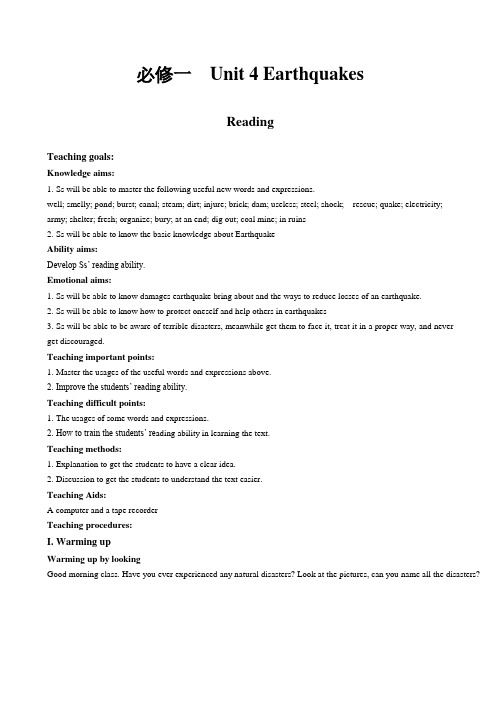
必修一Unit 4 EarthquakesReadingTeaching goals:Knowledge aims:1. Ss will be able to master the following useful new words and expressions.well; smelly; pond; burst; canal; steam; dirt; injure; brick; dam; useless; steel; shock; rescue; quake; electricity;army; shelter; fresh; organize; bury; at an end; dig out; coal mine; in ruins2. Ss will be able to know the basic knowledge about EarthquakeAbility aims:Develop Ss’ reading ability.Emotional aims:1. Ss will be able to know damages earthquake bring about and the ways to reduce losses of an earthquake.2. Ss will be able to know how to protect oneself and help others in earthquakes3. Ss will be able to be aware of terrible disasters, meanwhile get them to face it, treat it in a proper way, and neverget discouraged.Teaching important points:1. Master the usages of the useful words and expressions above.2. Improve the students’ reading ability.Teaching difficult points:1. The usages of some words and expressions.2. How to train the students’ re ading ability in learning the text.Teaching methods:1. Explanation to get the students to have a clear idea.2. Discussion to get the students to understand the text easier.Teaching Aids:A computer and a tape recorderTeaching procedures:I. Warming upWarming up by lookingGood morning class. Have you ever experienced any natural disasters? Look at the pictures, can you name all the disasters?volcano fire sandstormtyphoon hailstone thunderstormflood hurricane earthquakeHave you ever experienced an earthquake? Can you describe how terrible an earthquake is?(The earth is shaking; all the buildings will fall down; many people will die; many children will become orphans.) Warming up by discussingNow, look at the pictures of Tangshan and San Francisco in warming up and describe what you see in the pictures. (beautiful cities; broad roads; tall building; large population.)What will happen if there has been a big earthquake in these two cities?As we all know, earthquakes are disasters to everyone. But can we avoid or at least reduce the loss caused by earthquakes? Can we foretell earthquakes? Now let’s come to Pre-reading and decide what may happen before an earthquake comes.Step 1. Lead-in1. Enjoy a part of film of earthquake.(1) what other disasters does it have?(flood/ drought/earthquake/fire/typhoon/disease and so on)show some pictures(2) which disaster may cause the worst damage? ( earthquake)2. Have ever heard a story of an earthquake?(show video of Tangshan and San Francisco earthquake)3. Have you experienced an earthquake? If you have, tell me your experience. If no, just imagine what will happen before an earthquake?4. The earthquake is coming, if you’re trapped in the earthquake , how will you feel? What will you do? Will you leave right away? If you have time to take only one thing , what will you take, why?5. What kind of damage can an earthquake cause?( buildings are destroyed; people are killed; families are broken…)Step 2. Fast readingToday, we’ll learn a text “A Night the Earth didn’t sleep” First, let’s look at the title again, why the earth didn’t sleep for a night? What happened? What does the passage mainly talk about?Exchange your understanding of the passage with group members and work together to find the main idea of each part.Main idea of each part:Part 1 (para.1):Strange things were happening before the earthquake.Part 2 (para.2-3):The disaster happened and caused a lot of loss.Part 3 (para.4): All hope was not lost.Step 3. careful reading1.Read carefully and try to get more information to fill in the blanks.Part 1:Part 2:a). Get the students to find some details of this part.Details:1. At 3:42 am, the greatest earthquake of the 20th century began.2. Steam burst from holes in the ground.3. Hard hills of the rock became rivers of dirt.4. Bricks covered the ground like red autumn leaves.5. Two dams and most of the bridges fell.6. The railway tracks were now useless pieces of steel.7. Sand now filled the wells instead of water.8. Water, food, and electricity were hard to get.b). Fill in the blanks with the data❖1/3 of the nation felt the earthquake .❖ A huge crack that was 8 kilometres long and30 metres wide cut across houses.❖In 15 terrible seconds a large city lay in ruins.❖2/3 of the people died or were injured during the earthquake.❖The number of people who were killed or injured reached more than 400,000 .❖All of the city’s hospitals, 75% of its factories and buildings and 90% of its homes were gone.3.Group workPart 3:How were the people helped by the army?*The army organized teams to dig out those who were trapped and to bury the dead.*Miners were rescued from the coal mines.*Shelters were built for survivors whose homes had been destroyed.*Fresh water was taken to the city.Let the groups have a discussion with their partners about more ways to help the people in the earthquake.Step 4. Post-readingTrue or False1. There were one million people in Tangshan at that time. T2. The earthquake began 10 kilometres directly below the city. F3. Not only the people but also the animals were shocked greatly. T4. There was only one quake at that time. F5. Before the earthquake there wasn’t anything strange happening. F6. Workers rescued most of the 10,000 coal miners to the south of the city. F7.Almost everything in Tangshan was destroyed. TStep 5. Discussions.What shall we do or not do if an earthquake happens?Dos Don’ts1. Stay in a small room, such 1. Be close to the outside wallas kitchen or bathroom2. Hide under the table or 2. Stay on the balconybed, if you haven’t timeto escape , you may stand 3. Jump out of the tall buildingsclose to the inside wall withsome things covering on the 4. Use the lifthead.3. If you stay in the open air ,keep off the tall building,and go to the fields without trees .Step 6. SummarySeveral days before July 28, 1976, many strange things happened in Tangshan. They were signs for the earthquake. At 3:42 am that day, the earth began to shake, which destroyed the city. Later that afternoon, another big earthquake struck Tangshan. More people were killed or injured and more buildings fell down. Soldiers were called in to help the rescue workers. Teams were organized to dig out the trapped and bury the deadStep 7. homework1.Surf the internet to find more information about earthquakes.2.Finish the “learning about language” part on page 27.Step 8. reflection。
必修一unit4Earthquakes导学案
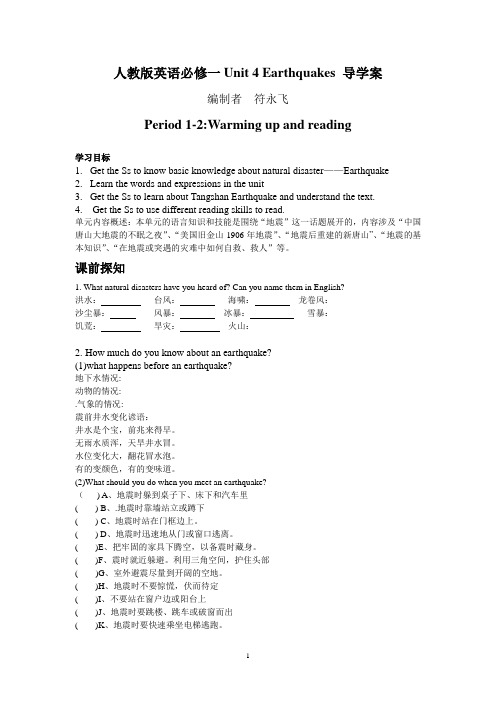
人教版英语必修一Unit 4 Earthquakes 导学案编制者符永飞Period 1-2:Warming up and reading学习目标1.Get the Ss to know basic knowledge about natural disaster——Earthquake2.Learn the words and expressions in the unit3.Get the Ss to learn about Tangshan Earthquake and understand the text.4. Get the Ss to use different reading skills to read.单元内容概述:本单元的语言知识和技能是围绕“地震”这一话题展开的,内容涉及“中国唐山大地震的不眠之夜”、“美国旧金山1906年地震”、“地震后重建的新唐山”、“地震的基本知识”、“在地震或突遇的灾难中如何自救、救人”等。
课前探知1. What natural disasters have you heard of? Can you name them in English?洪水:台风:海啸:龙卷风:沙尘暴:风暴:冰暴:雪暴:饥荒:旱灾:火山:2.How much do you know about an earthquake?(1)what happens before an earthquake?地下水情况:动物的情况:.气象的情况:震前井水变化谚语:井水是个宝,前兆来得早。
无雨水质浑,天旱井水冒。
水位变化大,翻花冒水泡。
有的变颜色,有的变味道。
(2)What should you do when you meet an earthquake?() A、地震时躲到桌子下、床下和汽车里( ) B、.地震时靠墙站立或蹲下( ) C、地震时站在门框边上。
( ) D、地震时迅速地从门或窗口逃离。
Earthquakes导学案Unit4英语人教必修一.docx
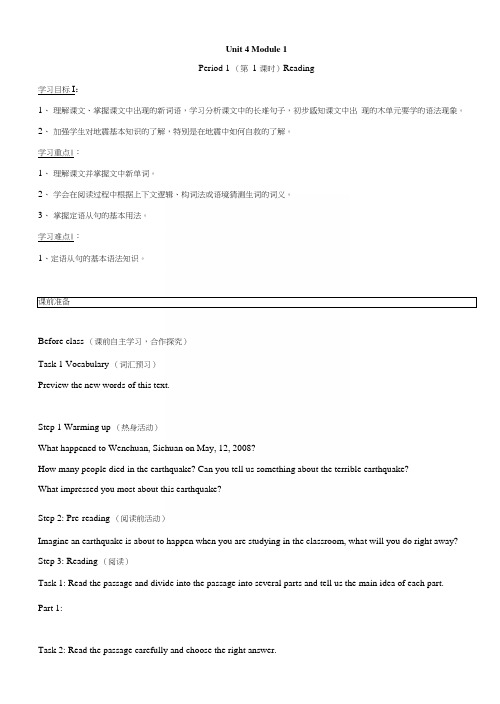
Unit 4 Module 1Period 1 (第1 课时)Reading学习目标I:1、理解课文、掌握课文中出现的新词语,学习分析课文中的长难句子,初步感知课文中出现的木单元要学的语法现象。
2、加强学生对地震基本知识的了解,特别是在地震中如何自救的了解。
学习重点|:1、理解课文并掌握文中新单词。
2、学会在阅读过程中根据上下文逻辑、构词法或语境猜测生词的词义。
3、掌握定语从句的基本用法。
学习难点|:1、定语从句的基本语法知识。
课前准备Before class (课前自主学习,合作探究)Task 1 Vocabulary (词汇预习)Preview the new words of this text.Step 1 Warming up (热身活动)What happened to Wenchuan, Sichuan on May, 12, 2008?How many people died in the earthquake? Can you tell us something about the terrible earthquake?What impressed you most about this earthquake?Step 2: Pre-reading (阅读前活动)Imagine an earthquake is about to happen when you are studying in the classroom, what will you do right away? Step 3: Reading (阅读)Task 1: Read the passage and divide into the passage into several parts and tell us the main idea of each part. Part 1:Task 2: Read the passage carefully and choose the right answer.1.The title of the text "A Night The Earth Didn't sleep" means _ ______ ・A.the earth was wide awake all night longB.people on the earth couldn't fall asleep that nightC.the earth shook like crazy that nightD.animals on the earth would not sleep that night2.The meaning of "lay in ruins "in Paragraph 2 is _________ .A.was totally destroyedB. lay in bedC. was hurtD. was out of control3・ People in Tangshan were asleep as usual that night because they ______・A.could never imagine there would be a terrible earthquakeB.thought they had prepared well for the earthquakeC・ thought it was easy to experience an earthquakeD・ thought sleeping was the most important thing no matter what happened4.Which of the following is NOT true according to the text?A. Tangshan earthquake was the greatest earthquakes of the 20,h century in China・B. 75% of the factories and buildings and 60%of the homes in Tangshan were goneC.The railway tracks were destroyed completely.D.Tens of thousands of cows would never give milk again.Task 3: Fill in the following sentences:1、Before the earthquake:A.The water in the wells ______ and fell and well walls had deep _____ ・B.Chickens and pigs were ______ ・ Mice ran out of the fields and fish jumped out of theponds・C.People saw ____ in the sky and heard the sound of planes and the water pipes in somebuildings cracked and ______ ・2、During the earthquake:A. At 3:42a.m. everything began to ________ • Then, later that afternoon, another big quakeshook Tangsha n・B. The large city lay _______ ・ Two thirds of the people were killed or _____ ・C・ Some of the ____ workers and doctors were trapped under the ruins. Water, food andelectricity were hard to get.3、After the earthquake:A.The army sent soldiers to help the rescue workers・B.Workers built _______ f or survivors whose homes had been destroyed・C・ ____ w as taken to the city by train, truck and plane. And electricity was hard to get.Task 4: Retell: Fill in the blanks according to the text.Strange things happened ] the Tangshan earthquake happened. The well walls had deep cracks・ A _2________________ (smell) gas came out of them・ The water pipes cracked and burst. At 3:423 the morning of July 2& 1976, everything began to shake・4 seemed as if the world was at an end. Steam burst from holes in the ground・ Hard hills of rock became rivers of dirt. The whole city lay in5 (ruin). Many people died or were6 (injure). Everything in the city7 (be) destroyed. People were8 (shock) at this and wondered how long thedisaster would last. The army organized teams to dig out those 9 were trapped and to bury the dead・ Workers built shelters for J0_ (survive). Fresh water was taken to the city. Slowly, the city began to breathe again.Step 4: After-reading (阅读后活动)Discussion:1.What do you think will happen before a big earthquake?2.If you see the warning signs of an earthquake, what should you do?3.课堂小结5•课后6. HomeworkPeriod 2 (第2 课时)Language study (词汇学习)学习目标1.掌握重点词汇的词性,搭趾及用法。
高中英语必修1人教版精品导学案:Unit 4 Earthquakes

Unit 4 Earthquakes第一课时:Warming-up & vocabulary预习导学:本单元重点词汇呈现单词识记__________ 摇动,颤动__________ 地震__________ 井__________ 上升,增加,起身__________ 发臭的__________ 突然爆发__________ 废墟,毁灭__________ 极度的__________ 损害,伤害v. __________ 幸存者,残存物__________ 破坏v __________ 砖块__________ 无用的__________ 震惊,打击__________ 营救__________ 电__________ 灾害__________ 组织v,__________ 埋葬,隐藏__________ 矿,矿井__________ 掩蔽,遮蔽处__________ 判断__________ 荣誉,给予荣誉__________ 新鲜的,无经验的__________ 百分率__________ 裂缝,使开裂__________ 蒸汽,水汽__________ 使惊吓,吓唬__________ 受惊的,受恐吓的__________ 祝贺n__________ 裁判员n;判断v __________ 表达v,速递__________ 骑自行车的人__________ 军队__________ 准备v.重点短语:r ight__________ 立刻burst ___ ____ = burst ____ ____突然大哭_____ _____ end 结束lay _____ _______ 成为废墟dig _____ 掘出,发现be _____ ___ / bury _____ ___专心… ___(_____) number of大量的give _____ 分发,发出(气味,热等)_____/ _____ a speech 作演讲________ from / by 从…判断___ honor ___ 为了纪念… tens ___ __________ of 成千上万_____ _____ 煤矿get _____ __________ 做好充足准备b egin to __________ 开始复苏__________ of 取代think ______ ___ 对…考虑少think ______ of 对…高度评价__________ workers 营救人员be _____ =be missing 丢失build _____ ___ _____ 为幸存者建造避难所be ____ __ = take _____ __为..感到自豪_____ the competition 赢得比赛be pleased ___ __ 很高兴做…break _____ 爆发be ________ under sth被困在下面___ ___ north __ 在某地方的北面put ___ 搭建(临时住所等)wake ___ 叫醒某人________ sth. for sth. 为…做准备语法:由who/ whom/ whose/ that /which等关系代词引导的定语从句口语交际如何表达感谢:I would like to _______ _______ _______ … who ….(我想向。
- 1、下载文档前请自行甄别文档内容的完整性,平台不提供额外的编辑、内容补充、找答案等附加服务。
- 2、"仅部分预览"的文档,不可在线预览部分如存在完整性等问题,可反馈申请退款(可完整预览的文档不适用该条件!)。
- 3、如文档侵犯您的权益,请联系客服反馈,我们会尽快为您处理(人工客服工作时间:9:00-18:30)。
Unit4 Earthquake- reading学案A Night the Earth Didn’t SleepⅠ.Why does the writer use “A night the earth didn’t sleep”as the title?________________________________________________________________________________ ________________________________________________________________________________ ________________________________________________________________________________ Ⅱ. Fast reading.What does the passage mainly talk about? When and where did the earthquake happen?________________________________________________________________________________Ⅲ.Scan the passage and find out the topic sentence of each paragraph.Ⅳ.How many parts can this passage be divided into?Data(数据)______of the nation felt the earthquake .A huge crack that was kilometers long and meters wide cutacross houses.In terrible seconds a large city lay in ruins.of the people died or were injured during the earthquake.The number of people who were killed or injured reached more than .All of the city’s hospitals, _ of its factories and buildings and of its homes were gone.Ⅵ.Translate the following sentences into Chinese.1.But the one million people of the city, who thought little of these events, were a sleep as usual thatnight.2. The number of people who were killed or injured reached more than 400,000.3. Then, another big quake which was almost as strong as the first one shook Tan gshan.4. The army organ ized teams to dig out those who were trapped and to bury the dead.Ⅶ.语言点:1.Imagine your home begins to shake and you must leave it right away…imagine:imagine + n. /pron./ G./ cl.imagine sb. to beshake : cause to move to and froright away : at once ; in no time ; immediatelyright now : at this very momentMake up your mind___________.I’ll return the book___________.2.burst : to come open or fly apart suddenlyThe balloon suddenly burst.burst into + n.Some robbers burst into that house.burst outburst out + doing They burst out laughing.burst into+ n. burst out + doing……He burst into laughter. = He burst out laughing He bu rst into tears. = He burst out crying.3 . But the one million people of the city, wh o thought little of these events, went to bed as usualthat night. ( Non- Defining Attributive Clauses )Do you want a friend whom you could tell everything to like your deepest…(Unit 1 )…because those who ruled England at that time spoke French. ( Unit 2 )The plains where rice grows. ( Unit 3 )( Defining Attributive Clause )4.T w o-t h i r d s o f t h e p e o p l e d i e d o r w e r e__injured__d u r i n g t h e e a r t h q u a k e.(1)two-thirds= two thirds More than 61% of the surface of the surface of the earth____covered by water.Seventy percent of the workers in this factory ______young.(2)injure: to hurt oneself/ sb / sth. physicallyCompare: injure/ hurt/wound Their criticisms _________him deeply. have hurtSmoking will _________his health.He was slightly ________in the car accident.He got ___________in the fighting.What you said ________my feeling.5. People began to wonder how long the disaster would last.wonder : v. A. to have a feeling of surprise.B. to be filled with curiosity or doubt.n. one that arouses astonishment, surprise ; admirationIt is no wonder (that )= No wonder (that)---Tom often works deep into the night every day.---No wonder he always gets first in the examinations.6. All hope was not lost.all…not … = not all….: some but not allNot all the children are left. (= Only some of them left early.)Not all the children are noisy.(= Some of the children are not noisy.)& none of …..None of us were allowed to go there.None of these reports is very helpful.1.Find out the difficult sentences in the passage .2.Do exercises on page 27—28. Ex. 1,2 & 3 ( Learning about language)3.Do exercises 1 & 2 on page 63. ( Using words and expres sions)4.Review Attributive Clause5.Imagine your home begins to shake and you must leave it right away. You have time to takeonly one thing. What will you take? Why ?答案A Night the Earth Didn’t SleepⅠ.Why does the writer use “A night the earth didn’t sleep”as the title?Night is the time to sleep, and night should be safe and quiet. But that night everything changed. The writer uses it as title to show how terrible and unusual that night was.Ⅱ. Fast reading. An earthquake happened in Tangshan in 1976Ⅲ.Scan the passage and find out the topic sentence of each paragraph.Ⅳ.How many parts can this passage be divided into?Ⅴ.Careful readingRead the passage carefully and find more information about it. Data(数据).1/38 3015 2/3400,00075%90%语言点:1. right nowright away4.isarehave hurtinjureinjuredwoundedhurt。
